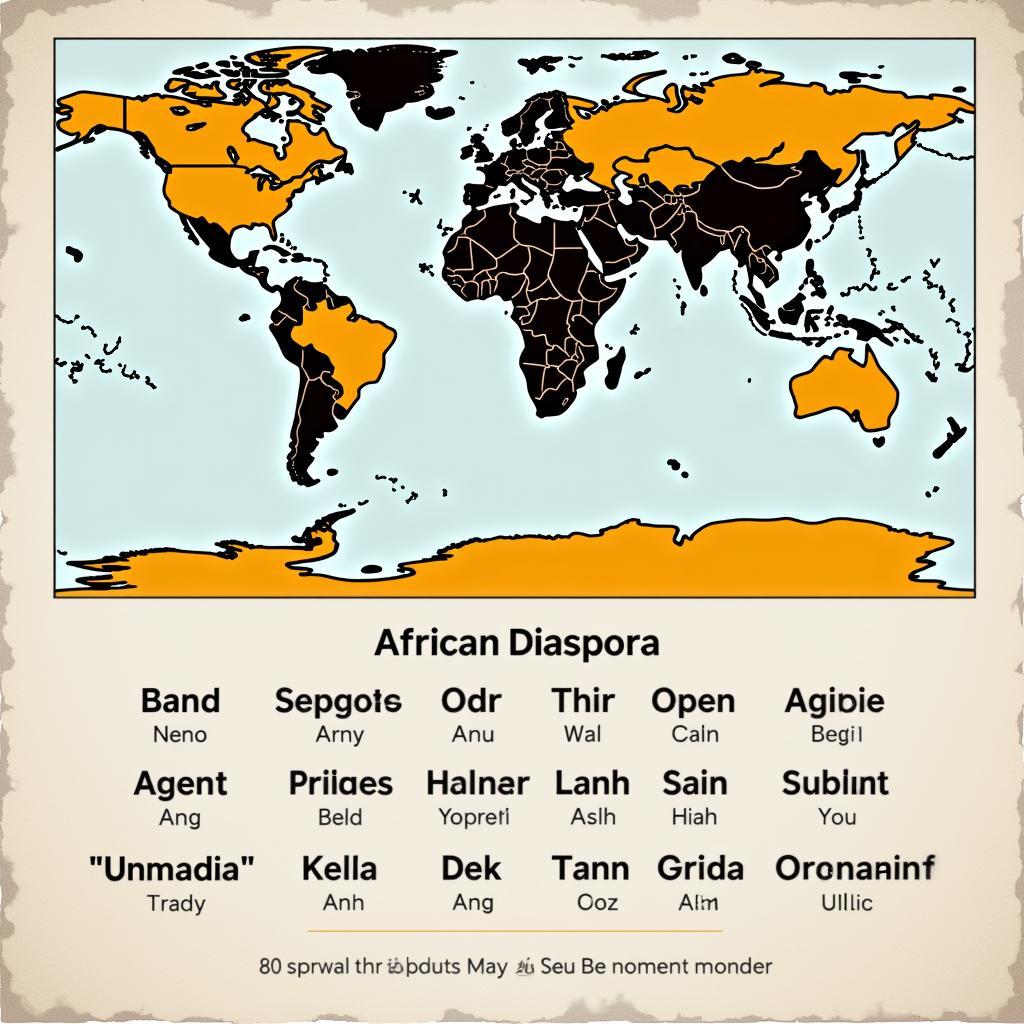Exploring African Food Habits: A Diverse Culinary Journey
African Food Habits are as diverse and vibrant as the continent itself. From the bustling marketplaces of Marrakech to the serene villages of the Serengeti, food plays a central role in African cultures, reflecting unique histories, traditions, and environmental adaptations. This article delves into the rich tapestry of African food habits, exploring the ingredients, cooking methods, and social customs that shape culinary experiences across the continent.
Regional Variations in African Food Habits
African cuisine is not a monolithic entity but rather a mosaic of distinct regional traditions. North Africa, with its proximity to the Mediterranean and historical influences from the Arab world, boasts a cuisine rich in spices, grains, and vegetables. Tagines, couscous, and dates are staples in this region, reflecting both local ingredients and cultural exchange. Moving south into Sub-Saharan Africa, we encounter a greater emphasis on root crops like yams, cassava, and sweet potatoes, along with plantains, legumes, and a variety of leafy greens. West African cuisine is known for its vibrant flavors, often incorporating peanuts, chili peppers, and tomatoes into stews and sauces. Southern Africa, with its diverse landscapes and wildlife, sees a greater inclusion of game meats in traditional diets.
The diversity of African food habits also extends to cooking methods. Across the continent, methods range from slow-cooking in clay pots over open fires to grilling and frying. In some regions, steaming and baking in underground ovens are common practices, preserving nutrients and creating unique flavor profiles. This variety reflects both the ingenuity of African cooks and the availability of resources in different environments.
The Role of Food in African Culture and Society
Beyond sustenance, food plays a profound role in African cultures and societies. Meals are often communal affairs, strengthening family and community bonds. Special occasions, such as weddings, funerals, and harvest festivals, are marked by elaborate feasts, often featuring symbolic dishes passed down through generations.
Food is also a powerful symbol of identity and heritage. Certain dishes are associated with specific ethnic groups or regions, reflecting unique culinary traditions and cultural pride. The preparation and consumption of these dishes often involve specific rituals and customs, reinforcing cultural values and strengthening social cohesion.
African Food Habits in a Changing World
Modernization and globalization are impacting African food habits in significant ways. The introduction of processed foods and fast-food chains has led to dietary shifts in some areas, raising concerns about nutritional health. At the same time, there is a growing movement to preserve and celebrate traditional African cuisines, recognizing their cultural and nutritional value. Chefs and food enthusiasts are innovating with traditional ingredients and recipes, introducing African flavors to a global audience.
 Modern African Cuisine with Artistic Plating
Modern African Cuisine with Artistic Plating
Maintaining a balanced diet is becoming increasingly important for individuals with African Grey Eating habits. Furthermore, the eating patterns of these birds demonstrate a unique approach.
What are some common staple foods in different regions of Africa?
Common staple foods vary significantly across Africa. In North Africa, couscous, wheat, and barley are prevalent. West Africa relies heavily on rice, yams, and cassava. Southern Africa includes maize, sorghum, and millet in their diets. East Africa enjoys ugali (made from maize flour), matoke (plantains), and potatoes. Central Africa features cassava, plantains, and yams as staple foods.
How do African food habits reflect environmental adaptations?
African food habits demonstrate remarkable adaptability to diverse environments. Arid regions rely on drought-resistant crops like sorghum and millet, while coastal communities incorporate fish and seafood into their diets. The use of preservation techniques like drying and fermentation also reflects adaptations to seasonal variations in food availability.
Are there specific food taboos in African cultures?
Yes, many African cultures have food taboos, often related to religious beliefs, social status, or health considerations. These taboos can vary widely between different ethnic groups and regions. For instance, some communities restrict the consumption of certain animals or specific parts of animals.
African Food Habits: A Culinary and Cultural Treasure
African food habits offer a fascinating glimpse into the diverse cultures and rich history of the continent. From traditional dishes passed down through generations to modern interpretations of classic flavors, African cuisine is a testament to the ingenuity and adaptability of African cooks. As we explore the vibrant world of African food, we discover not only a culinary adventure but also a deeper understanding of the continent’s cultural heritage. Understanding these habits helps us appreciate the diverse dietary needs across species, including the unique dietary requirements of the African Flying Squirrel.
Dr. Abimbola Adebayo, a renowned anthropologist specializing in African cultures, states: “Food is more than just sustenance in Africa; it’s a powerful symbol of community, identity, and heritage. Every meal tells a story.”
Chef Fatmata Binta, a celebrated West African chef, adds: “African cuisine is a vibrant tapestry of flavors and textures. It’s a celebration of our history and a testament to our creativity.”
FAQ
- What is the most common cooking method in Africa? Various cooking methods are used across Africa, including stewing, grilling, frying, and steaming.
- What is the significance of communal meals in African culture? Communal meals reinforce family and community bonds and are often central to social gatherings and celebrations.
- How are African food habits changing in modern times? Globalization and urbanization are influencing dietary shifts, but there’s also a growing movement to preserve and celebrate traditional African cuisines.
- Are there any health concerns related to changing African food habits? The increased consumption of processed foods has raised concerns about nutritional health in some areas.
- What are some examples of traditional African beverages? Traditional beverages include palm wine, hibiscus tea (bissap), and ginger beer.
There are no price details to display as this article discusses cultural practices.
Here are some common situations where you might have questions about African food habits:
- Planning a trip to Africa: Researching local cuisines and dining customs can enhance your travel experience.
- Trying African recipes at home: Understanding the ingredients and techniques used in African cooking can help you recreate authentic flavors.
- Learning about different cultures: Exploring food habits offers a fascinating window into the diversity of African cultures.
Looking for more information on related topics? Explore our articles on African American height weight chart or African Elephant Big Teeth.
Need assistance? Contact us 24/7: Phone: +255768904061, Email: kaka.mag@gmail.com, or visit us at Mbarali DC Mawindi, Kangaga, Tanzania. Our customer service team is ready to help.


